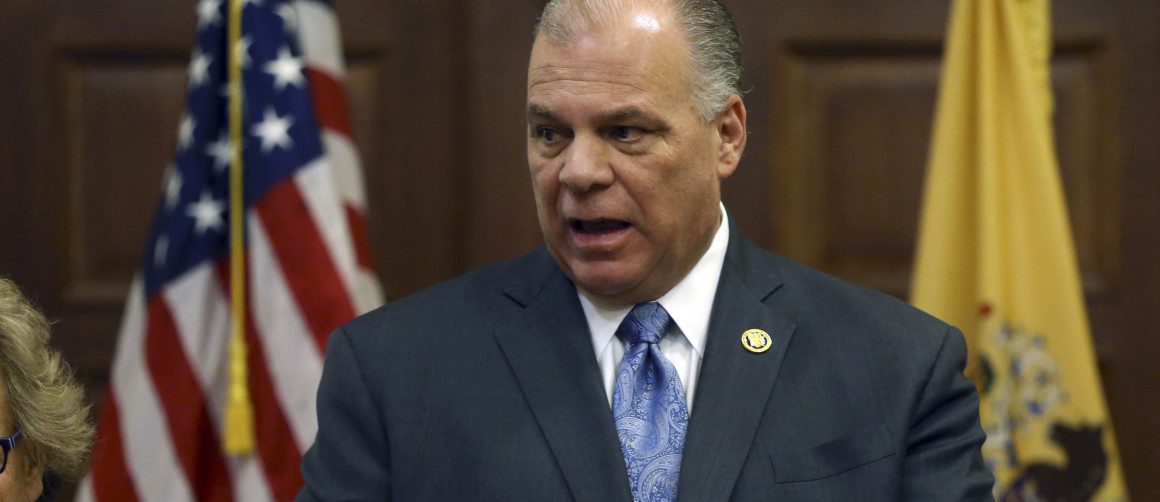TRENTON — The state Legislature has yet to produce a pair of bills to legalize recreational marijuana and expand the state’s medical cannabis program, but Senate President Steve Sweeney says he has the votes lined up to pass both measures by the end of September.
“There’s some people that will never support it and there are some people who are just hedging their bets because there’s not a bill to look at,” Sweeney (D-Gloucester) said during a wide-ranging sit-down interview with POLITICO.
Still, the Senate president said he‘s certain he and Assembly Speaker Craig Coughlin (D-Middlesex) will secure the necessary votes in their respective chambers to pass both measures.
“I’m confident we‘ll get to 21 and 41,” Sweeney said, referring to the minimum number of votes needed for passage in the Senate and Assembly, respectively. “I‘m not going to get to 28, but I’m confident I’ll get to 21 votes and the speaker will find 41.
“Don’t be surprised when people who say they were against it vote for it,” Sweeney said, predicting some Republican support.
While an expansion of the state’s medical marijuana program enjoys some support across the aisle, Republican lawmakers have typically opposed legalizing recreational use. The Legislature won’t expand access to medical marijuana without legalizing cannabis statewide, Sweeney said, reiterating a promise he made earlier this summer.
“Listen, we’re going to need to work with [Republicans] to pass it,” he said. “I can’t get anyone to make a commitment on something that they have no idea what it looks like, nor would I expect them to make the commitment.”
New Jersey’s path to legalization got considerably easier in early August when Coughlin for the first time publicly endorsed allowing recreational use. Gov. Phil Murphy has previously said he’d like marijuana to be legalized by the end of the year and state Attorney General Gurbir Grewal has ordered municipal prosecutors to suspend marijuana-related cases until early September.
While Sweeney said the Democrat-controlled Legislature is close to completing drafts of both bills, major questions remain about how they’ll be structured. They could include language that would expunge the records of individuals with criminal convictions for marijuana-related offenses, though it’s unclear how the state would facilitate the expungement process, or who would qualify.
“We’re trying to motivate to create a regulated system,” Sweeney said. “If we expunge your record, and it’s a clean slate, and now we’ve made the product available, legally, and you then keep buying it illegally? What do we do?”
Coughlin, Sweeney and Murphy have all cited the potential to alleviate social injustices as central to their push to legalize recreational use. Assembly members Jamel Holley and Annette Quijano, both Democrats from Union County, have said their support for legalization is tied to the inclusion of criminal expungement.
State Sen. Ron Rice (D-Essex) head of the Legislative Black Caucus, has said he opposes legalization, preferring decriminalization instead. One area where Sweeney offered some clarity is on how the Legislature plans to tax legal pot, saying he’d prefer something lower than the 25 percent rate proposed by Murphy earlier this year.
“I don’t want [the tax rate] to be 25 percent, because then you’re just going to keep the black market alive,” he said. “If you tax it too high, you incentivize people to use the black market because you’ve raised the price too high.”
In addition to supporting legalization of recreational marijuana, Murphy made expanding the size and scope of New Jersey’s medical cannabis program a priority in the early days of his administration. In March, the state Department of Health added five qualifying conditions for medical marijuana, including anxiety, migraines and chronic pain. The program has added 10,000 patients since the start of Murphy’s term in January, bringing total enrollment to more than 25,000, according to the Department of Health. Of those recently enrolled, roughly 6,300 qualified under one of the conditions the department added in March.
Health Commissioner Shereef Elnahal has also said he’s considering expanding the program to include include opioid addiction as a qualifying condition.

